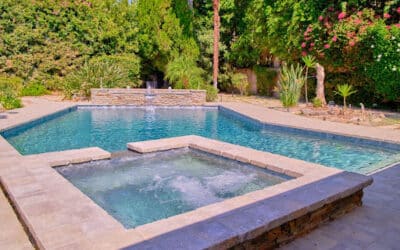If you want to have a remodel and pool/backyard makeover, one of the changes that will make the most impact is your choice of pool decking – and you can count on the expertise and experience of Stanton Pools to help you choose from the many different deck materials!
Swimming pools must have a pool deck that will not only complement your pool design – landscape and the backyard as a whole – but it must also be durable, safe, and at the same time cost-effective.
There are several deck materials when it comes to your inground swimming pool. Here are your pool decking options:
Inground Pool Deck Options
Different Pool Decking Costs
Cost: As of 2023, here are the prices of the different pool deck materials per square foot:
- Concrete $16-$20
- Pavers $18-$25
- Natural stone $35-$50
- Wood decking $25-$35
- Tile $35-$50
Aside from the price, here are other considerations to help you make an informed choice.
Concrete Pool Decks
Concrete is a popular choice for pool decking due to its durability and low maintenance requirements. Aside from slip resistance, poured concrete makes it flexible to create a design of any shape or size.
You have the option of stamped concrete which makes it possible to use practically any color and texture, even to mimic other materials such as brick or stone. The design possibilities are endless with stamped concrete!
The advantages of a concrete pool deck:
- Concrete is a very durable material and can withstand heavy foot traffic, harsh weather conditions, and pool chemicals. It can also be stamped, stained, or painted to create a unique design and enhance the overall look of your pool area. Lifespan estimate: 20+ years
- Concrete pool decks are relatively easy to maintain. You can use a hose or pressure washer for regular cleaning plus sealing every 2-3 years.
- A relatively more affordable pool deck option than other available deck materials.
The disadvantages:
- Concrete absorbs heat and can become very hot in the sun, making it uncomfortable to walk barefoot, not to mention the fact that concrete radiates back the heat, adding to the warm discomfort.
- Concrete can crack over time due to changes in temperature or the settling of the ground beneath it.
- When wet, concrete can be very slippery, increasing the risk of falls and injuries.
- If and when pool repair work has to be done underneath the deck (e.g., if a leak occurs), it takes more time to uncover the areas needing repair as the contractor will need to saw cut and demo out a section of your patio. Additionally, you will see an obvious color and texture difference as there will be a noticeable patch to cover up the hole made in the patio from this repair.
Pavers
Pavers are another popular choice for pool decking, as they are available in a wide range of colors, shapes, and sizes. It is a popular option because of its slip resistance and durability.
Another advantage of pavers is that when repair work around the pool has to be done, they are the easiest to work with, because if repairs are necessary, a pool remodeling contractor will just lift up the pavers, perform the needed repairs, and put them back into place without anyone being able to notice that work has been done.
Proper installation is also crucial to prevent tripping hazards.
Advantages of pavers:
- Pavers can handle heavy foot traffic, pool chemicals, and extreme weather changes, which makes them a long-lasting option for pool decks. They can last 20 years or more.
- They are available in different colors, textures, shapes, and sizes, for flexibility of your pool deck style and design.
- Slip-resistant: Pavers have a naturally slip-resistant surface, which can improve safety around the pool area, especially when wet.
- Low maintenance: Pavers are relatively low maintenance, requiring only occasional cleaning and sealing to maintain their appearance. A sealant is recommended every 18 to 36 months.
- Easiest to work when work around the pool is required. Pavers are simply lifted off for pool repair work, then placed back in without having any change in color, unlike with stamped concrete.
Cons:
- Heat absorption: Pavers can absorb and retain heat, making them uncomfortable to walk on in hot weather with bare feet.
Natural Stone
Natural stone is a popular option for pool decks due to its natural beauty, durability, and slip-resistant feature. To help you decide, here are some pros and cons of natural stone for pool decks:
Pros:
- Durability: Natural stone is quite durable and can withstand harsh weather conditions and heavy foot traffic. They can last 20+ years.
- Aesthetic appeal: Natural stone provides a timeless and elegant look that can enhance the overall beauty of a pool area.
- Low maintenance: it is relatively easy to clean and maintain, making it a convenient option for pool decks.
- Non-slip surface: Many natural stone options offer a slip-resistant surface, which can be especially important for pool decks where water can make surfaces slippery.
- In terms of versatility, there are many options available including slate, granite, sandstone, and limestone, which lets you have more room to choose according to aesthetics and budget.
Cons:
- Natural stone can absorb heat, which makes it uncomfortable to walk on during hot days.
- There are certain types of natural stone, such as sandstone, which are more porous and can absorb water and stains more, and would thus need maintenance.
- Fading or Discoloration: Natural stone can fade over time due to temperature changes, especially lighter-colored stones.
Wood Decking
Wood decking will give your inground pool deck a rustic warm appeal, but it requires more to maintain than other materials. Choose a type of hardwood that is most resistant to rotting and insect damage. The most popular hardwoods available are redwood, cedar, mahogany or ipe, an exotic hardwood.
Pros of Wood Decking
- Creates a warm and natural look around the pool area
- Can be customized to fit any shape or size
- Slip-resistant when textured or coated with a non-slip surface
- Lowers the surface temperature when compared to concrete or stone
Cons of Wood Decking
- Requires regular maintenance to prevent rotting, warping, or splintering
- Can be prone to discoloration or fading over time
- Can be slippery when wet or covered in debris
- Can be expensive depending on the type of wood
- Not as durable as other materials and may need to be replaced if not maintained properly
- Shorter life span of 10-20 years, which is shorter than most other pool decking options.
Tile
Tiles can provide a sleek and modern look for pool decks. However, there are also some potential drawbacks to using tiles as a pool deck material. Here are some pros and cons of using tiles for pool decks:
Pros:
- Durable and long-lasting
- Resistant to fading and staining from pool chemicals and sunlight
- Slip-resistant
- Easy to clean and maintain
- Customizable in terms of color, shape, and texture
- Adds value and style to the property
Cons:
- More expensive than other decking options
- Requires professional installation
- Prone to cracking or chipping if not properly installed or maintained
- May become slippery if not textured properly
- Reflects sunlight, which can make it uncomfortable to walk on during hot days
Overall, tiles can be a great option for a pool deck, but they can be more expensive and require professional installation. It’s important to choose a slip-resistant tile and take proper care of it to ensure it lasts for many years.
Get Your Dream Deck with Stanton Pools
When choosing a pool decking option, consider factors such as cost, durability, maintenance requirements, and aesthetic appeal. It is also important to choose a material that is slip-resistant to prevent accidents around the pool.
All things considered, pavers are our material of choice. This is because there is a lot going on around a pool – underground gas, electrical, and plumbing. Pavers make these utilities relatively easy to access in the event of an issue (breakage, leak, etc.).
Also, if we have to repair something underground, we can lift up the pavers, do the repair, and put those same pavers back down and no one will ever be able to tell there was a repair done. No patch will be visible.
With concrete, conversely, you’d be able to see an obvious color and texture difference as there will be a noticeable patch if we have to cut out a section of the concrete to do an underground repair.
Stanton Pools is happy to work with you and give you a new deck that complements your swimming pool. With a beautiful landscape to frame your pool area, your backyard will indeed be an oasis you and your family and friends will surely enjoy for years to come!




0 Comments